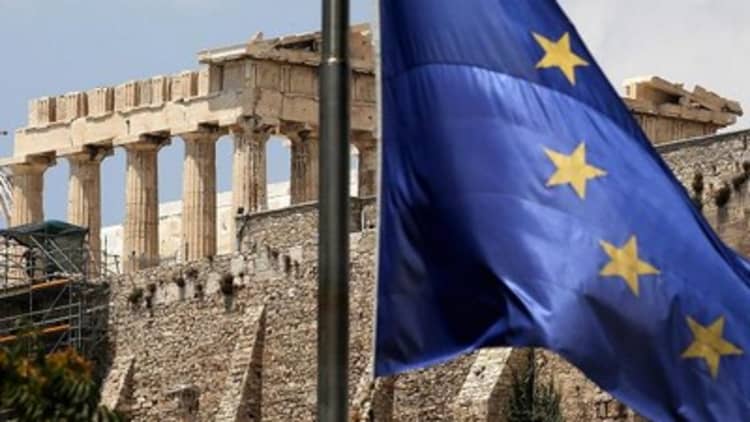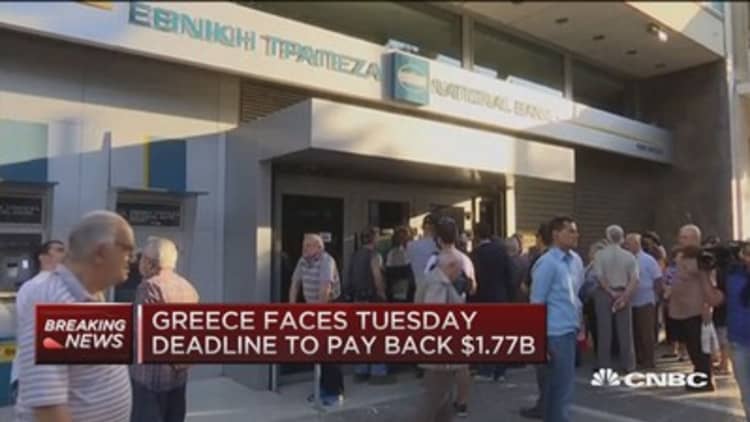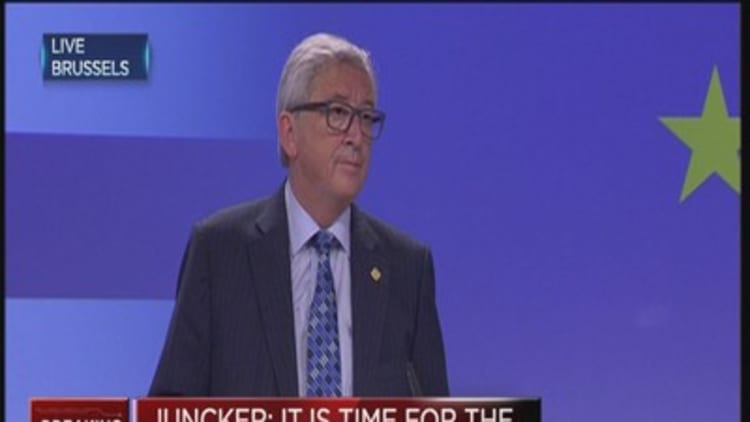


Greece and the euro zone face a week of political and financial uncertainty after the Greek Prime Minister's shock announcement of a referendum on the country's creditors' proposals to resolve its debt.
Greece's place in the single currency union now hangs in the balance as a result of a tumultuous weekend. Last-ditch talks between Greece and its lenders broke down, after Greek Prime Minister Alexis Tsipras surprised lenders late on Friday by announcing a referendum on the country's bailout and the reforms demanded by its lenders on July 5.
Although details of the measures they will actually be voting for or against are not yet public, Greeks are expected to vote on whether to accept the bailout measures offered by international creditors, which come with the strings of prolonged austerity measures attached, or to reject them and potentially leave the euro zone.
Around 1 p.m. BST, Reuters reported that Tsipras had held a call with the president of the European Commission, Jean-Claude Juncker.
Juncker had hit back at Greece on Monday, telling a press conference in Brussels that the creditors' bailout proposals were "fair."
He said that he felt "betrayed" by Greece and added that while he did not expect Greece to exit the single currency area, no country in the euro zone was worth more than any other. He emphasized that Greek citizens needed to have a clear picture of what was at stake in a referendum.

Earlier on Monday, EU Commissioner Pierre Moscovici refused to be pessimistic about the outcome of five months of wranglings over reforms between Greece and lenders. During an interview on French radio, he maintained a deal could still be found, despite the latest twist in the Greek saga.
Juncker said in his press conference that he had no new proposals for Greece, however.
Crucial vote
A vote rejecting the bailout program, largely funded by Greece's European counterparts, is likely to lead to Greece's exit from the euro zone which could set a dangerous precedent for the single currency area as other countries could follow suit.
Haris Theocharis, Greek member of parliament for the centrist To Potami party, told CNBC Monday that he hoped the Greek people understood what a "no" vote would mean.
"The real question is on whether we are going to continue to be in the euro zone or not and that's what the people have to decide," he told CNBC in Athens Monday.
Read MoreWill a Greek tragedy be the euro's downfall?
"A 'yes' vote is a 'yes' for the euro zone and a 'no' vote is effectively one to begin the process of leaving the euro zone and this would be a catastrophe for Greece and a shame for the rest of the euro zone…We have to fight for the 'yes' (vote), there is no doubt about that."
Theocharis hoped Tsipras would be "punished" by the referendum vote because he was "gambling with the fate of Greece for something that he could have resolved."
"We're very critical that he has chosen the path of not choosing that deal. He needs to sober up and change tack and ensures that he comes to terms with reality and what our European partners demand."
Read More Capital controls: Greeks and tourists to be hit hard
Capital controls
After the surprise move announcing the referendum, Tsipras asked for an extension of Greece's existing bailout until after the July 5 vote but euro zone officials refused.
In addition, the European Central Bank said it would not raise the level of emergency funding to the country's banks prompting Greece's central bank to recommend that Greek banks remain closed.
Despite prior assurances from his government that there would be no limit on withdrawals , Greek Tsipras said Sunday that he had forced the country's central bank to recommend a bank holiday and capital controls – a 60 euro ($67) limit on withdrawals from cash machines.
Read MoreIMF's Lagarde on Greece: 'Progress', but next few days are crucial
No officials date has has been given for when capital controls will end. Originally, they were seen lasting a week, but Reuters has reported, citing a Greek official, that banks could reopen on Thursday. The stock market will be shut all week.
Similar measures imposed in Cyprus lasted for nearly two years.
In a statement, Tsipras said that the "It is clear that the objective of the Eurogroup's and ECB's decisions is to attempt to blackmail the will of the Greek people and to hinder democratic processes, namely holding the referendum. They will not succeed."
Left without a deal, however, Greece is now expected to default on a 1.5 billion euro debt due to the International Monetary Fund (IMF) on Tuesday. The head of the Fund, Christine Lagarde, told CNBC this weekend that she still hoped the payment would be made.
Market turmoil
Market analysts are expecting Greece to drive volatility in financial markets this week and European markets plunged on Monday and the yield—interest rate—on Greek debt surged too.
Michael Hewson, chief market analyst at CMC Markets, said in a note Monday the "Greek butterfly looks set to cause a tornado in financial markets" this week.
"(The) belief that an apparently minor event could cause a significant seismic event elsewhere in the world is at the heart of chaos theory, and markets today and this week are likely to get a foretaste of this as Greece plunges head first into a referendum on its future in the euro," he added.
Read More Global markets slide on Greek crisis fears
In a statement on Monday, the European Commission said it was closely monitoring the situation and that capital controls would have to be lifted as soon as possible, for the sake of Greece and the rest of the euro zone.
"While the imposed restrictive measures appear necessary and proportionate at this time, the free movement of capital will however need to be reinstated as soon as possible in the interest of the Greek economy, the Eurozone, and the European Union's single market as a whole," it said.
- CNBC's Julia Chatterley contributed reporting to this story written by CNBC's Holly Ellyatt, follow them on Twitter @JChatterleyCNBC and @HollyEllyatt.


